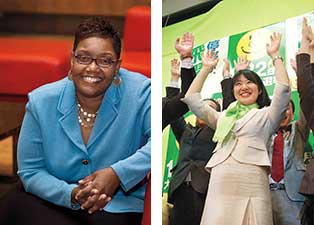Other than their Harvard Law degrees, Naomi Koshi LL.M. ’09 and Karen Freeman-Wilson ’85 don’t appear to have much in common. They live in opposite parts of the world and are different in professional background, ethnicity and age. And yet they share a certain connection. Both were recently elected the first female mayors of cities that are in the middle of their countries and are sometimes overshadowed by their neighbors. The cities are first in their hearts, however—the places where they grew up and which they want to help grow.
Home, for Koshi, is Otsu, Japan. The seeds of her mayoral run were planted when she was in junior high school and her grandmother broke her leg. Her mother was forced to quit her job to take care of her for 10 years, with no support from the Japanese government. “I was so frustrated, and I thought, I have to change this system,” Koshi says, “so this was my first motivation.”
More motivation came at Harvard Law School. As a student in 2008, she saw many young people involved with the Obama campaign and admired their passion to effect change. She was convinced she could do it, too.
After graduating, she first worked for a law firm in New York and then served as a visiting fellow at Columbia Business School. Returning to Japan last year, she decided to run for mayor in October. Like Obama, she was criticized for being too young, at 36, and for not having enough experience. “During my campaign, I said, ‘I have new vision—I have the point of view of young people,’” says Koshi.
In January, she won by a wide margin, becoming mayor of the capital city of the Shiga Prefecture with a population of 340,000. Otsu, however, is less well-known than its neighbor Kyoto, home to spectacular temples. “Sometimes I think Otsu is like New Jersey,” she says, noting that it is considered a bedroom community whose residents commute elsewhere to work. She would like to attract more tourists to Otsu, a beautiful city in its own right, she says, which boasts the biggest lake in Japan as well as rivers and mountains.
She is the youngest female mayor in Japan’s history, standing as an example of progress in a country that has not traditionally elected women to political office. As a leader, she will work to ensure that women have more options. In Japan, she says, it is still hard for women to work after having a child. Someday, that is exactly what she would like to do.
Home, for Freeman-Wilson, is Gary, Ind. As mayor of the city, she recently traveled to a high school to honor students who took part in a “good deeds” campaign. She was greeted by a participant, a man she herself went to high school with in Gary in the ’70s. At that moment, she wasn’t the mayor. She was just Karen from back in school.
“You are serving folks that you have known all your life.”
Karen Freeman-Wilson
“It’s a very good feeling, certainly a very humbling experience, but it also is a reminder that you’re serving folks that you’ve known all your life,” says Freeman-Wilson. “It’s almost an extra incentive to do well.”
Those kinds of encounters happen to her every day, in a “large city that has a small-town feel,” she says. Gary is perhaps best known as the birthplace of Michael Jackson and as a city built by U.S. Steel. It has faced its share of troubles in recent times, with a declining population, high unemployment and many abandoned buildings. When Freeman-Wilson was sworn into office in January, the Chicago Tribune wrote that many observers believe “she and her city are on borrowed time.”
But she says she is determined to bring business back to Gary, pegging economic development to the city’s transportation assets, like rail lines, major interstates and an airport that can serve as an alternative to those in Chicago, which is only about 30 miles away. As someone who served as a judge, Indiana attorney general and CEO of the National Association of Drug Court Professionals, she also is intent on lowering the crime rate, working to “create a culture of disapproval” toward lawbreakers who mar the city, she says.
“Our community is more similar to other communities than not,” says Freeman-Wilson. “A majority of Gary residents are hard-working, God-fearing people, and they want their children to have better opportunities than they did.”
They are people like her mother and others of her generation, who made it possible for her to become the city’s first female mayor, she says. She hopes as her 18-year-old daughter grows up—whatever she achieves—it will no longer be notable that a woman is in any role she deserves.
